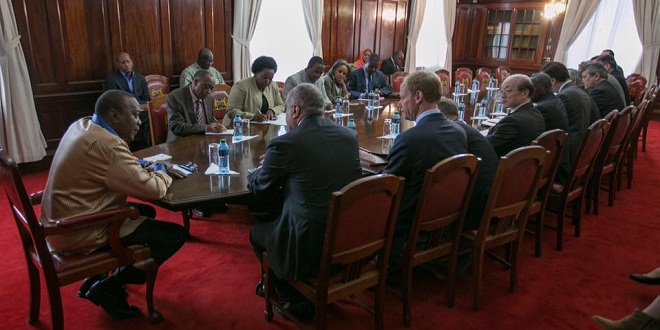
ANALYSIS
Nairobi, Kenya | AFP |
Kenya’s plan to close the world’s largest refugee camp could be a bid to trigger more international aid as well as a “cynical” political move ahead of presidential elections, according to analysts and NGOs.
The sprawling Dadaab camp, located on the Kenya-Somalia border, hosts almost 350,000 refugees, the vast majority of whom are Somalis fleeing conflict.
The government announced on May 6 it would refuse new refugee arrivals and close down Dadaab, citing national security fears.
But analysts say this is unlikely from a legal and logistical standpoint.
“I don’t think they will close the camp,” said Anne Hammerstad of the School of Politics and International Relations at the University of Kent in England and an expert on refugee issues.
“It would cause a huge humanitarian crisis, plus sending Somali refugees back would mean violating international conventions,” she told AFP.
Kenya has already twice threatened to shut down Dadaab, and Britain’s UN ambassador Matthew Rycroft on Friday said Kenyan President Uhuru Kenyatta assured him that Nairobi would abide by its “international obligations.”
In announcing the plan, Interior Minister Joseph Ole Nkaissery repeated claims that attacks on Nairobi’s Westgate shopping mall in 2013, at the Garissa university in 2015 and elsewhere, “were planned and deployed from Dadaab refugee camp by transnational terrorists”.
However, no credible evidence has yet been provided to support the allegations.
Nairobi has also bemoaned the high cost of maintaining Dadaab, even though the international community, via the UN refugee agency (UNHCR) covers most of the amount.
The UNHCR has voiced “profound concern” over the planned move, while hailing Kenya’s “extraordinary role over the years in hosting refugees.” The country is currently home to some 600,000 refugees.
Victor Nyamori, Amnesty International’s refugee affairs officer in Kenya, said he was “totally opposed” to the closure but agreed that “in a sense, we agree with Kenya, the international community does not do its part.”
‘Timing is significant’
But a Western diplomat in Nairobi noted that “the timing of the announcement is significant”.
The plan was revealed ahead of an international humanitarian summit in Istanbul, of the upcoming visit to Kenya by the head of the UN refugee agency and the expiry in September of a 2013 deal on Somali refugees between Nairobi, Mogadishu and the UNHCR.
Analysts say it a way for Kenya to put the issue back on the international agenda at a time when the world’s attention is focused on the migrant crisis in Europe, and as Nairobi is unhappy with the slow pace of voluntary repatriations to Somalia envisaged under the 2013 accord.
“Kenya wants more money, as a host country for refugees, to build schools and roads in northeast Kenya, to reinforce security around the camps,” said Ben Lawrence, author of the book “City of Thorns” which recounts the lives of refugees in Dadaab.
He noted that the last time that Kenya threatened to close Dadaab, in April 2015, the United States promised the country $45 million.
The example of Turkey
“Kenya certainly takes Turkey as an example,” Lawrence said, referring to the March deal under which Ankara agreed to take back migrants landing on Greek islands in exchange for incentives, including billions of euros in aid and visa-free European travel for its citizens.
“The EU-Turkey deal has set a dangerous precedent of welcoming refugees not because it’s right, but because people will pay you for it,” said Hammerstad.
Also behind the Kenyan decision is “a more cynical political objective”, warned Cedric Barnes, an expert on the Horn of Africa for the non-governmental organisation the International Crisis Group.
Ahead of presidential elections in August 2017, the government “wants to show that it is in charge of security, one of the weakest aspects of Kenyatta’s presidency.”
Lawrence agreed that “this is a well-known pattern in Kenyan politics — pick one community, blame it for the worst things and unite everyone else around this.”
 The Independent Uganda: You get the Truth we Pay the Price
The Independent Uganda: You get the Truth we Pay the Price



